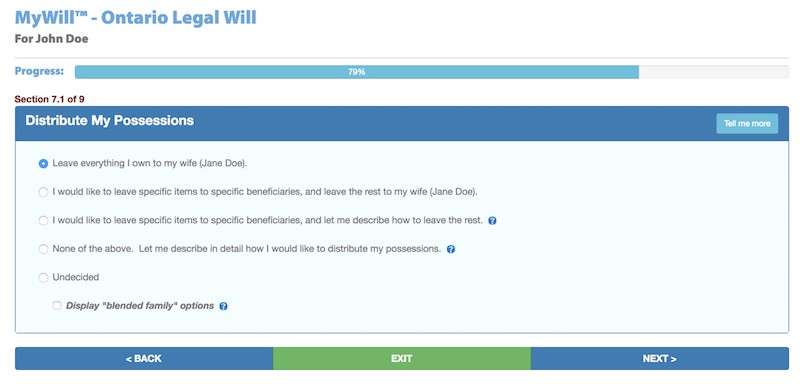Table of Contents
Introduction to Preparing a Will
Everybody should have a Will. Not making a Will is unfair to those you leave behind. Even if your plans for estate distribution are simple and you do not have many assets, it is still much easier for the people that you leave behind to work with a Will than to resolve the estate of a person who has died intestate (without a Will). If you do not feel that you have significant assets now, remember that your Will only comes into effect when you die, not now, and you cannot possibly predict how large your estate will be when your Will is required. Preparing a Will is one of the most important tasks you can undertake if you have loved ones. Sadly, most of us put it off until it is too late.
By law, any competent adult can make their own legal Will; the law does not require you to have an attorney or a lawyer, to do this. A Will does not need to be a complicated document; it simply has to clearly state your wishes for the distribution of your estate.
The Last Will and Testament
What is a Will?
A Will (or Last Will and Testament) is a legal document that you prepare during your lifetime that describes how your money, property and other assets are to be distributed when you die. The Will can also include provisions for setting up trusts for children and the custody or guardianship of those children (who you wish to take care of them).
The other important piece of your Will is the naming of an “Executor”, the person with the responsibility to take care of everything after you have passed away. Your Executor has to gather up your assets, secure them, and then distribute the assets according to the instructions in the Will. They are also responsible for any associated paperwork, like filing your final year taxes.
A Will does not have to follow any special structure to be a legal document and no special legal words are required. As long as you clearly state your instructions and sign the document appropriately, then it will serve as a legal Will. Standard legal clauses (called “precedents”) are often used as they are known to work and not be open to misinterpretation.
A Will should not be confused with a Living Will which is a different type of document that is in effect while you are alive. A Living Will describes your wishes for healthcare if you are in a terminal condition or unable to speak for yourself.
When does a Will take effect?
A Will only comes into effect at the moment of death. You are free to do anything with your assets all the time that you are alive even if you have included those assets in your Will. For example, if you plan to leave your Honda Accord to your brother, and then subsequently sell the car, you brother will get nothing (the bequest is said to be “adeemed”). However, if you sell that Honda Accord and buy a new Honda Accord, then the new car would go to your brother, as long as it fitted the description in the Will (you have ‘restored the adeemed property’).
Do you need a Lawyer to write a Will?
There is no legal requirement to have a lawyer prepare your Will. In many cases there is no practical need for a lawyer to be involved in the preparation of your Will, particularly if your family situation and plans for estate distribution are straightforward. A very common Will would instruct words to the effect that “my entire estate to go to my spouse, Jane Doe, and if we are both involved in a common accident, to divide my entire estate in equal shares between my children”.
This is not a complicated Will if you use a software tool to prepare the document. You probably wouldn’t need any special legal advice to prepare a Will that has this type of distribution plan. Software tools for writing a Will like the one at LegalWills.ca have evolved significantly over the years and are appropriate for the vast majority of situations.
What happens if you don’t make a Will?
The people you leave behind will have two problems; nobody will have been appointed as the Executor of your estate, and you will not have expressed your wishes for how your estate should be distributed. The courts will appoint an administrator of the estate, and the courts will determine who will receive what parts of your estate. The whole process could take a very long time and there is a good chance that the courts directions will not match your wishes.
The distribution plan for an “intestate” estate (a person who dies without a Will) is different in every Province. But in every Province the distribution plan can be unusual. Almost no plan written into a Will matches the Provincial distribution plans for an estate without a Will.
Changes in Relationships
A will is automatically revoked (cancelled) if you get married unless the Will explicitly states that it is made in contemplation of marriage. Divorce causes the sections of the Will relating to your ex-spouse to be ignored i.e. it is read as if your ex-spouse never existed. Separation does not revoke a Will. It is very important to update your Will every time there is a change to your marital status. Common-law partners do not have the same claims on property as married partners.
How often should you update your Will?
Throughout your life, you are free to update your Will as often as you like, either by making an amendment, or by drafting a new Will. An amendment to an existing will is called a “codicil” and must follow the same form and structure of a full Will (i.e. it must be properly signed and witnessed). Consequently, writing a codicil is not usually much of a shortcut. In fact, it can lead to significant confusion.
Codicils were popular back in the day when a change to a Will would have required somebody to type up a whole new document. Nowadays with computers and printers, codicils are rarely used because they offer no benefit and can cause a great deal of confusion.
It is strongly recommended that if you wish to make changes to your Will, that you create a new Will and revoke and destroy all previous Wills. Never, ever, make handwritten amendments to your printed Will.
Not updating a Will can be as bad as not having a Will at all. Even if you feel that there have not been many changes in your life, your Will should be reviewed every year on a routine basis.
Beyond the routine reviews of your Will, you should consider updating your Will in the following circumstances:
• If somebody named in your Will dies
• If a major asset is purchased or sold
• If you remarry, separate, divorce or cohabit
• If you move to a new province/state or country
• If your executor or alternate executor are no longer willing or able to serve
• If any new children are born, adopted, or pass away
• If any person named in your Will becomes seriously ill
• If your children reach the age of majority
• If you wish to change some beneficiaries
• If you wish to redistribute your property in a different way
How to revoke (cancel) a Will
A Will is revoked under certain circumstances including;
• You get married
• You create a new Will that revokes previous Wills
• You destroy your Will with the intent of revoking it
Divorce does not revoke a Will, it only cancels the portions of the Will related to your ex-spouse
Where to store your Will
After the Will is signed you must keep the original and all copies in a safe place, and let your executor know where the original is stored. It is very important that your Executor is able to find your Will at the appropriate time. Although the document must be kept safe, it should not be inaccessible. If you choose to store it in a safety deposit box, check that your Executor will be able to gain access at the appropriate time.
At LegalWills.ca you can store many documents directly online. You can keep an inventory of your assets using the LifeLocker tool, you can upload key documents using the MyVault tool. But only a printed, signed piece of paper is accepted as your legal Last Will and Testament. An uploaded version would not be accepted by the courts.
Can you write a Will for somebody else?
Legally you can complete the service at LegalWills.ca on behalf of another person. You are not permitted to provide legal advice, or portray yourself as a legal professional if you are not qualified.
If you step through the service on somebody else’s behalf e.g. a family member, you should print the final document, and hand it to the family member. They should have the capacity to understand that it is their Will and understand what the document is doing e.g. the distribution of their estate and key appointments.
They are not required to understand every word of the document, but they must understand the broad instructions contained within the document.
They would then have to sign the document in the presence of two independent witnesses. Once signed and witnessed, it becomes a legal Last Will and Testament.
Preparing your Will
Essentials of a Will
The Will has the following structure:
• It identifies the person making the Will (you), otherwise known as the “testator”.
• It revokes (cancels) all previous Wills, to make it clear that this Will replaces any earlier Wills you may have made.
• It names the personal representative, called the “executor”, for your Will. This is the person who will be responsible for distributing your estate (property) according to the wishes outlined in your Will.
• It leaves all of your property to your executor in trust. The executor, as the trustee of the estate, is given ownership of all of the property in your estate after you die, but must distribute the property according to the instructions in your Will.
• It instructs the executor to pay all valid debts, expenses, claims and taxes on your estate.
• It tells the executor to give your beneficiaries whatever is left in the estate after the debts, expenses, claims and taxes have been paid.
• It gives the executor certain legal and financial powers to manage your estate, including power to keep or sell property in the estate, to invest cash, and to borrow money.
• It names one or more people who should take custody of any minor children.
Joint Wills
A joint Will is a single document, signed by “co-testators” (usually spouses), intended to reflect the wishes of both parties. This is generally considered to be an extremely bad idea, and probably worse than having no Will at all. Often, the intent of a joint Will is to declare that each person would leave everything to the surviving partner, and in the event that both partners are victims of a common disaster, everything would go to their children. The problem is that it is unclear whether a surviving partner can revoke a joint Will and many messy legal cases have arisen as a result of this confusion.
In short, do not make a joint Will, as there could be problems if either party changes their mind, or wishes to amend the Will. There may also be problems if the surviving spouse tries to make any changes to a joint Will, as they may be bound to the original terms. Furthermore, there is no reason to create a joint Will, there is no disadvantage to drawing up a separate Will for each partner.
You should each prepare your own Wills naming each other as your main beneficiary, with an alternate plan to cover a common accident. This is called a “Mirror Will“, and services like the one at www.legalwills.ca make the creation of a Mirror Will extremely straightforward. We even offer a 40 percent discount on the second document.
How to choose an Executor or Personal Representative
Your Executor will use your Will to speak on your behalf as if you were alive. This is a responsibility that you would not want to give to just anyone. Typically, your executor will be a family member or close friend. Most commonly it is a spouse or a child. Most importantly, the executor must be a person whom you trust completely.
If you do not know anybody who has all of the required qualities, then an independent professional will do the job for a fee. Do not choose somebody who is too old, unstable or ill, nor should you appoint a minor, an incompetent person or a convicted criminal. Select a person who is diligent and acts with integrity. Otherwise, they may fail to follow appropriate accounting practices e.g. not file accurate tax returns, pay off debts or make poor investment decisions. A poor executor may not distribute your property in a timely manner or according to your wishes. In extreme circumstances, the executor may actually embezzle funds for themselves or to benefit favoured beneficiaries.
Can the executor also be a beneficiary in my Will?
Yes. Your executor has a legal responsibility to treat all beneficiaries fairly under the directions given in your Will. There is nothing preventing your executor from being a beneficiary of your estate, unless there is a danger that they may not treat all beneficiaries equally. In fact, for a simple distribution of the estate, where most of the estate is passing to a single beneficiary, it is common for that beneficiary to also be named as the executor of the Will. For people who are married, the first choice executor is often chosen to be their spouse.
Why you should name an Alternate Executor?
You should name an alternate executor in case any of your first choice executors cannot, or do not want to serve. If you have named more than one executor, your alternate will replace the executor who cannot serve. If you have only named one executor, then the alternate will simply replace them as the sole executor. If you do not name an alternate and your first choice cannot serve, then a person will be appointed by the courts to distribute your estate.
Organ and body donations
You may wish to donate your body or organs after you have died. You can certainly note this, but these instructions should not be written into your Will. Feel free to write and sign a document that expresses your wishes for organ and body donation and keep these instructions with your Will, but do not attach them to your Will or include the instructions in the content of your Will. They are not legally binding instructions and are not by law regarded in the same way as your wishes for the distribution of your estate.
Your funeral directions
It is not a good idea to include funeral instructions in your Will. Usually your funeral will happen within a few days of your death, and possibly way before your Will has been accessed and probated. You can write out your funeral wishes and sign the document. Keep this document with your Will, but do not attach it to your Will. LegalWills.ca has a separate (free) service called MyFuneral, that allows you to describe your funeral wishes.
Gifts of personal and household effects
For each item that you are leaving to a specific beneficiary, you should provide an accurate description. This item may be a specific item of jewelry, or a house, or a sum of money, it doesn’t really matter, it must be very clearly identified and it must be your property. The next step is to name the beneficiary. Make sure that the name that you provide uniquely identifies the individual (not just “John” or “my cousin”), you should also include the beneficiary’s address.
Don’t be intimidated by this section — as long as you clearly state your intentions, your wishes will be enforced. Even if you name a person, and they subsequently change their name or address, as long as they are identifiable as your intended beneficiary and everybody knows who you are referring to, then you do not need to update your Will.
You must be completely explicit in your wording. A term like “divide my estate equally between my cousins and my friend Bill” has at least five different interpretations.
For each bequest, you should name an alternate beneficiary in the event that your first choice beneficiary does not survive you. You do not have to name an alternate, but it is usually a good idea. If you do not have an alternate, and your first choice beneficiary cannot receive the bequest, then the property will go to your residual beneficiary.
Making alternate provisions
For every bequest made in a Will, it is important to include an alternate provision, this will explain what will happen if your first intention cannot be fulfilled for whatever reason. For example, if you state in your Will that your cottage should go to your daughter, you should make a provision just in case your daughter pre-deceases you, or you are both involved in the same accident.
Residue clauses
It is very important that you include in your Will a plan for everything in your estate. Your executor needs to know your intentions for all of your possessions, and you have to assume that your first intention cannot always be fulfilled. In order to catch all of the assets that cannot be distributed according to your wishes, every Will usually has a residual clause. This clause gives away the residual or remainder of the estate. If any of your beneficiaries pre-deceases you (and no alternate is named) then the item will become part of the residual estate. Any item that you have not explicitly named in your Will also becomes part of the residual estate.
Beneficiaries
Beneficiaries are the individuals that you name in your Will to receive a share of your estate including any specific possessions. When you name them in your Will it is important to identify them so that your intentions cannot be misinterpreted. You should include their full name and full address so that your Executor can clearly identify them. If the beneficiary predeceases you (dies before you) the item will go to the alternate beneficiary if you have one or to the residual beneficiary. If it a major item, it is a good idea to write a new Will.
Leaving property to children
By law, you cannot leave cash or property directly to a minor. You must leave the bequest “in trust”, and a trust will be set up for the benefit of the minor. You can also set up this type of property management for any other beneficiary who is still young and may not be mature enough to accept a large bequest. You should determine the age at which the trust will expire (or decide to divide the distribution across different ages e.g. one third at 21, one third at 25 and the remainder at 28). A “trust” is a legal arrangement in which you pass the ownership of property to a “trustee” who will manage that property for the benefit of another person or organization (the “beneficiary”). The trustee is the “legal owner” of the property, but the beneficiary is regarded as the “beneficial owner” of the property. The key concept of a trust is that the beneficiary cannot access the property other than what is distributed by the trustee. When including a trust as part of your Will, you are creating a “testamentary trust”, as it will only come into effect after your death.
Disinheriting
By Canadian law you must now provide for people who are dependent on you for support, your spouse, and people that you have promised to provide for. Although you must, by law, provide for dependents including a spouse and minor children, you are still free to leave out other people who may expect to receive something. These people include friends, relatives, and adult children as long as you are not currently providing for them. In many cases it is a good idea to explain exactly why you are not including them in the distribution of the estate (e.g. you already gave them a loan, you disapprove of some of their actions or beliefs, they are independently wealthy, etc.). If you do not explain why they have been disinherited, they may make a claim against your Will on the basis of you not being of sound mind at the time of writing.
Guardians for children
A Personal Guardian will take legal responsibility for minors in the event of the death of the parents. When you appoint a personal guardian in your Will, you are expressing your preference for who you would like to raise your children. This may be an emotional decision, but it is very important to cover the eventuality even if there are currently two parents. It is not uncommon for both parents to be lost due to a common disaster. If you are the sole custodial parent, it is absolutely vital that you clearly state who you would like to take responsibility for your children should you die.

Copyright: stockbroker / 123RF Stock Photo
Signing the Will
In order to make the Will a legal document, you should first print it and read it thoroughly. Make sure that it accurately reflects the wishes of the testator (the person for whom the Will is being written) and that they understand everything that is contained in the document. Once the testator is happy that it reflects their wishes, they must sign the Will in the presence of at least two witnesses, and the two witnesses must also sign the Will, in the presence of the “testator” and in the presence of each other. The testator and the witnesses should also initial each page, so that it is not possible to alter any pages after the Will has been signed. A witness cannot be a beneficiary of the Will, they cannot be the spouse of a beneficiary (at the time of signing), they cannot be a minor, and, like the “testator”, they must be of sound mind.
For the signing procedure, gather the witnesses together in a room. The testator should make a formal statement that they have gathered the witnesses in order to witness the signing of the Will. They do not have to read the Will or know its contents. They are only required to witness the signature.
The testator should initial each page in turn, in the bottom corner of each page, and then sign their name in full on the last page, in full view of the witnesses. Each witness then in turn initials each page, in the bottom corner of each page, and signs the last page. Everybody must stay present until all of the signing is complete. Each witness should write their address alongside their signature, print their name below, and then add the date.
There should only be one original of the Will for everyone to sign. Copies can be created by photocopy. It is therefore a good idea to sign the original in blue ink, so that it is easily distinguishable from the photocopies. Do not sign the photocopies, as this will create duplicate originals which can be difficult to administer.
Glossary of legal terms
Beneficiary:
A person or organization that receives something from the Will. They “benefit” from the distribution of the estate.
Bequest:
A bequest is a gift of money or other property identified within a Will or trust. Any item that you leave to another person is a “bequest” and the person receiving this item is called a “beneficiary”.
Codicil:
An amendment page or document that allows you to alter the contents of your Will. This document must be signed and witnessed in the same way as the original Will.
Estate:
All of your property, possessions, money and other assets that you leave behind. Everything that you own becomes your estate that is then distributed according to the directions written in your Will.
Executor:
Otherwise known as a “Personal Representative” or “Trustee” this is the person named in your Will who takes responsibility for gathering up the estate and distributing it according to the directions in your Will.
Intestate:
The term used to describe a person who dies without a valid Will. If this happens, the courts will decide how the person’s estate will be distributed.
Legacy:
Any property or money given by a Will.
Living Will:
A document that identifies which medical treatments a terminally ill member would want.
Minor:
A child who has not yet reached the age of majority (age 18 or 19 depending on the Province). A minor cannot inherit anything from a Will unless it is put into Trust.
Personal Representative:
Another term for the Executor
Residue:
Any assets left after the debts, taxes, liabilities and all specific bequests have been taken care of.
Revoke:
To cancel a Will
Testator:
The person making the Will.
Trust:
Funds that are left to people who are not able to directly receive the funds. They are administered by the Executor or Trustee until the Trust expires.
The service at LegalWills.ca
At LegalWills.ca it takes about 20-30 minutes to prepare a Will. The cost for the service is $39.95 plus applicable taxes. You simply step through the 10 sections, answering questions presented to you in everyday language. You do not need to have any legal knowledge whatsoever to step through the service.
To make your document a legal Last Will and Testament you should firstly download and print it. It must then be signed in the presence of two adult witnesses who are not beneficiaries in the Will. These can be any two adults; friends, neighbours or co-workers, as long as they have nothing to gain from the contents of the Will.
Once it is signed and witnessed, it becomes a legal Last Will and Testament. There is no requirement to have the document notarized, stamped, or signed by a lawyer. Nor does the document need to be registered.
You simply store the document somewhere safe, in a place that is known and accessible to your Executor. After you have passed away, your Executor should take the document to your local probate court, where it is accepted as your Will, and filed with the courts.
- Probate in Canada – What it is, what it costs, how to reduce fees. - January 6, 2025
- All about Trusts – how to include a Trust in your Will - June 9, 2022
- The Holographic Will – what is it and when should you use one? - May 18, 2022




















